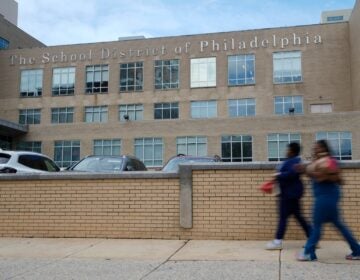Philly public schools drop writing sample, add standardized tests back to selective admissions process
Students will no longer be required to complete a writing assessment and the district will resume using PSSA results for its criteria-based middle and high schools.

Elementary school students play before the first day of classes in Philadelphia on Aug. 31, 2021. (Kimberly Paynter/WHYY)
The School District of Philadelphia will make two changes to its admissions requirements for selective schools in order to make the process more equitable for the 2023-24 school year, the district announced Tuesday.
Students will no longer be required to complete a writing assessment and the district will resume using results from the Pennsylvania System School Assessment (PSSA) for its criteria-based middle and high schools.
“There is a place for the PSSA as a standardized measurement criteria for the school selection process, but we realize that it’s just one test score achieved on one day. Multiple measures of student performance are always preferable,” Superintendent Tony B. Watlington Sr. said in a written statement.
Grades, attendance, and PSSA or other test scores will be weighted equally in this year’s application process, which opens on Sept. 16 and closes on Nov. 4.
“We have also considered the very real impact the COVID-19 pandemic has had on our students and their families,” Watlington said, adding that PSSA admission criteria by school will be adjusted this year “in light of the learning loss and other challenges our students have experienced.”
The district’s school selection process allows students in Pre-K through 11th grade to apply to any school outside of their neighborhood or catchment area as long as there are open seats.
Students who meet the academic qualifications of the district’s 34 special-admissions schools will be admitted by lottery or waitlisted. Lottery results are set to be released on Jan. 13, 2023, through the end of the waitlist process on Feb. 2, 2023.
The district will hold three town hall sessions later this month to share more about the process and what families can expect.
Last fall, the district made significant changes to its then long-established process, including implementing a computer-based lottery which shifted power away from school principals who at the time had some control — and in some cases, final say — over admissions decisions.
The district also decided to give admissions preference at its top magnet schools to qualified students from the city’s most underrepresented ZIP codes in an attempt to create more opportunities for Black and brown students.
Philadelphia’s selective high schools historically have had more white and Asian students than other city schools, and fewer students with special needs, English language learners, and students living in poverty.
The ZIP code preference drew significant backlash, including a federal lawsuit claiming the school system adopted a “blatantly unconstitutional, race-based” system.
More students — and more students of color — met admissions criteria last year under the district’s new policies, though a very small number of Black and Latino students actually qualified for the city’s most selective schools, according to the district.
This year, students from six ZIP codes – 19140, 19134, 19132, 19121,19133, and 19130 — will receive preference for four criteria-based high schools and two criteria-based middle schools.
The 19139 ZIP code, which covers a portion of West Philadelphia, is new this year, replacing 19135, in the Tacony neighborhood, the district said.
Watlington said the district will assemble a “diverse project team” to assess the district’s current policies and discuss possible changes for next year’s selection process.
The district also plans to secure an external auditor to review this year’s selection process and issue a report.

Get daily updates from WHYY News!
WHYY is your source for fact-based, in-depth journalism and information. As a nonprofit organization, we rely on financial support from readers like you. Please give today.








